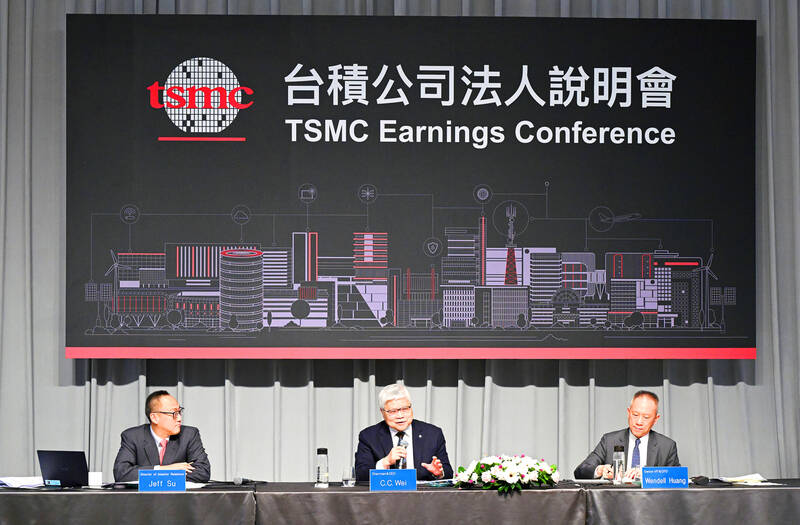Taiwan Semiconductor Manufacturing Co (TSMC, 台積電) yesterday increased its projected revenue growth for this year to above 25 percent, as stronger-than-expected demand for premium smartphones and artificial intelligence (AI) devices are to drive greater utilization of cutting-edge 3-nanometer and 5-nanometer chips.
In April TSMC estimated 21 to 24 percent annual growth.
The firm’s revenue growth is on track to greatly outpace the global foundry industry, which is expected to rise about 10 percent this year.

Photo: Liao Chen-hui, Taipei Times
“Over the past three months, we have observed stronger AI and high-end smartphone demand from our customers, which is to boost the overall capacity utilization for our leading-edge 3-nanometer and 5-nanometer technologies in the second half of 2024,” TSMC chairman and CEO C.C. Wei (魏哲家) told an investors’ conference in Taipei yesterday. “Thus, we continue to expect 2024 to be a strong growth year for TSMC.”
TSMC hiked its capital expenditure budget for this year to between US$30 billion and US$32 billion, compared with an earlier expectation that it would be US$28 billion to US$32 billion.
Up to 80 percent of the new budget would be for advanced process technologies, it said.
TSMC expects 3-nanometer and 5-nanometer capacity to be tight this year and through next year, as most customers are trying to pack their devices with AI functions, Wei said.
Advanced packing capacity would continue to be constrained through next year, even though TSMC plans to more than double its chip-on-wafer-on-substrate capacity next year, he said.
For this quarter, TSMC expects revenue to reach an all-time high, expanding by 7.59 percent to 11.43 percent sequentially to between US$22.4 billion and US$23.2 billion compared with US$20.82 billion last quarter.
About half of TSMC’s revenue last quarter came from 3-nanometer and 5-nanometer chips, which were primarily used in AI applications and high-performance computing devices, it said.
“Moving into the third quarter, we expect our business to be supported by smartphone and AI demand for our leading-edge process technologies,” Wei said.
Gross margin is expected to improve further from 53.2 percent last quarter to between 53.5 percent and 55.5 percent this quarter, largely due to improved factory utilization, TSMC said.
The chipmaker maintained its long-term gross margin target at more than 53 percent, given mounting manufacturing costs, mainly from overseas fabs.
With two new fabs in Arizona and Kumamoto, Japan, to commence operations next year, gross margin would go down by 2 to 3 percentage points, it said.
Regarding former US president Donald Trump’s remarks that Taiwan took chip business from the US, Wei said that TSMC would stand pat on its global expansion strategy with ongoing projects in the US, Japan and Europe.
The chipmaker has no plans to form joint ventures to accelerate overseas capacity expansion, he added.
In the April-to-June quarter, TSMC’s net profit was NT$247.85 billion (US$7.6 billion), up 36.3 percent from NT$181.8 billion a year earlier and 9.9 percent from NT$225.49 billion in the previous quarter.
Earnings per share rose from NT$7.01 a year earlier and NT$8.7 a prior quarter to NT$9.56.
Operating margin rose from 42 percent a year earlier and the previous quarter to 42.5 percent, while operating margin surpassed the chipmaker’s guidance of 40 to 42 percent.

TECH CLUSTER: The US company’s new office is in the Shalun Smart Green Energy Science City, a new AI industry base and cybersecurity hub in southern Taiwan US chip designer Advanced Micro Devices Inc (AMD) yesterday launched an office in Tainan’s Gueiren District (歸仁), marking a significant milestone in the development of southern Taiwan’s artificial intelligence (AI) industry, the Tainan City Government said in a statement. AMD Taiwan general manager Vincent Chern (陳民皓) presided over the opening ceremony for the company’s new office at the Shalun Smart Green Energy Science City (沙崙智慧綠能科學城), a new AI industry base and cybersecurity hub in southern Taiwan. Facilities in the new office include an information processing center, and a research and development (R&D) center, the Tainan Economic Development Bureau said. The Ministry

ADVERSARIES: The new list includes 11 entities in China and one in Taiwan, which is a local branch of Chinese cloud computing firm Inspur Group The US added dozens of entities to a trade blacklist on Tuesday, the US Department of Commerce said, in part to disrupt Beijing’s artificial intelligence (AI) and advanced computing capabilities. The action affects 80 entities from countries including China, the United Arab Emirates and Iran, with the commerce department citing their “activities contrary to US national security and foreign policy.” Those added to the “entity list” are restricted from obtaining US items and technologies without government authorization. “We will not allow adversaries to exploit American technology to bolster their own militaries and threaten American lives,” US Secretary of Commerce Howard Lutnick said. The entities

Minister of Finance Chuang Tsui-yun (莊翠雲) yesterday told lawmakers that she “would not speculate,” but a “response plan” has been prepared in case Taiwan is targeted by US President Donald Trump’s reciprocal tariffs, which are to be announced on Wednesday next week. The Trump administration, including US Secretary of the Treasury Scott Bessent, has said that much of the proposed reciprocal tariffs would focus on the 15 countries that have the highest trade surpluses with the US. Bessent has referred to those countries as the “dirty 15,” but has not named them. Last year, Taiwan’s US$73.9 billion trade surplus with the US

The Taipei International Cycle Show (Taipei Cycle) yesterday opened at the Taipei Nangang Exhibition Center, with the event’s organizer expecting a steady recovery in the industry this year following a tough last year. This year, 980 companies from 35 countries are participating in the annual bicycle trade show, showcasing technological breakthroughs and market development trends of the bicycle industry at 3,600 booths, the Taiwan External Trade Development Council (TAITRA, 外貿協會) said in a statement. Under the theme “Ride the Revolution,” the exhibition has attracted more than 3,500 international buyers from 80 countries to preregister for the four-day event, which is expected to